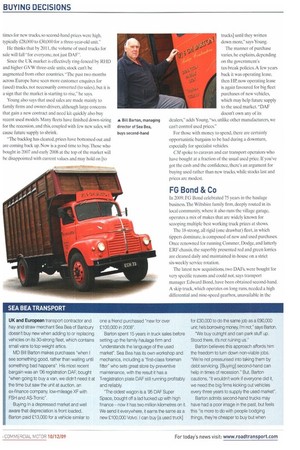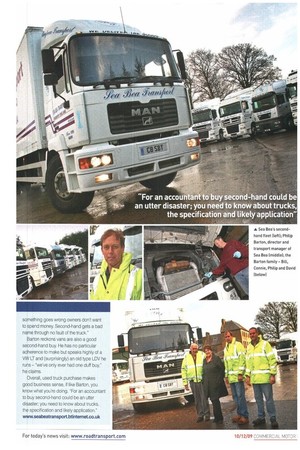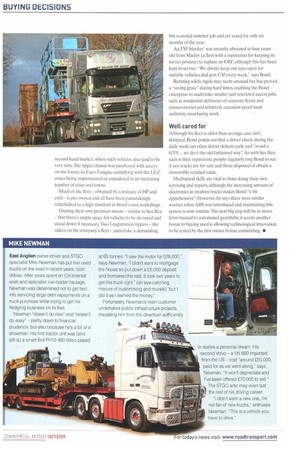SEA BEA TRANSPORT
Page 36

Page 37

Page 38

If you've noticed an error in this article please click here to report it so we can fix it.
UK and European transport contractor and hay and straw merchant Sea Bea of Banbury doesn't buy new when adding to or replacing vehicles on its 30-strong fleet, which contains small vans to top weight attics.
MD Bill Barton makes purchases when I see something good, rather than waiting until something bad happens". His most recent bargain was an '06 registration OAF, bought "when going to buy a van, we didn't need it at the time but saw the unit at auction, an ex-finance company, low-mileage XF with FSH and AS-Tronic".
Buying in a depressed market and well aware that depreciation is front loaded, Barton paid 213,000 for a vehicle similar to one a friend purchased "new for over £100,000 in 2008".
Barton spent 15 years in truck sales before setting up the family haulage firm and "understands the language of the used market". Sea Bea has its own workshop and mechanics, Including a "first-class foreman fitter" who sets great store by preventive maintenance, with the result it has a T-registration plate OAF still running profitably and reliably.
"The oldest wagon is a '95 DAF Super Space, bought off a lad tucked up with high finance—now it has two million kilometres on it. We send it everywhere, it earns the same as a new 2100,000 Volvo. I can buy [a used truck] for £30,000 to do the same iob as a -290,000 unit; he's borrowing money, I'm not," says Barton.
"We buy outright and can park stuff up. Stood there, it's not ruining us."
Barton believes this approach affords him the freedom to turn down non-viable jabs. "We're not pressurised into taking them by debt servicing. [Buying] second-hand can help in times of recession." But, Barton cautons, "it wouldn't work if everyone did it, we need the big firms kicking out vehicles every three years to supply the used market".
Barton admits second-hand trucks may have had a poor image in the past, but feels this "is more to do with people bodging things, they're cheaper to buy but when something goes wrong owners don't want to spend money. Second-hand gets a bad name through no fault of the truck."
Barton reckons vans are also a good second-hand buy. He has no particular a herence to make but speaks highly of a LT and (suronsingly) an old type LDV he ru s — "we've only ever had one duff buy," h claims.
Civerall, used truck purchase makes good business sense, if like Barton. you kn w what you're doing. 'For an accountant to buy second-hand could be an utter di aster; you need to know about trucks, the specification and likely application." itiww.seabeatransportbtinternetco.uk second-hand market, where such vehicles also tend to be very tatty. The tipper chassis was purchased with an eye on the future, its Euro-5 engine complying with the LEZ zones being implemented or considered in an increasing number of cities and towns.
Much of the fleet obtained by a mixture of HP and cash is pre-owned and all have been painstakingly refurbished to a high standard in Bond's own workshops.
Owning their own premises means similar to Sea Bea that there's ample space for vehicles to he de-taxed and stood down if necessary. Two J-registration tippers the oldest on the company's fleet undertake a demanding but seasonal summer job and are taxed for only six months of the year.
An FM `blockef was recently obtained at four years old from Marley (a fleet with a reputation for keeping its lorries pristine) to replace an ERF, although this has been kept in service. "We always keep our eyes open for suitable vehicles, dad gets CM every week." says Bond.
Running solely rigids may seem unusual but has proved a "saving grace" during hard times, enabling the Bond enterprise to undertake smaller and restricted access jobs, such as residential deliveries of concrete floors and conservatories and relatively recession-proof local authority resurfacing work.
Well cared for
Although his fleet is older than average, care isn't skimped. Bond points out that a driver check during the daily wash can often detect defects early and "avoid a GV9.., we do it the old-fashioned way". As with Sea Bea, such is their reputation, people regularly ring Bond to see if any trucks are for sale and those disposed of obtain a reasonable residual value.
Mechanical skills are vital to firms doing their own servicing and repairs, although the increasing amount of electronics in modern trucks makes Bond "a bit apprehensive". However, he says there were similar worries when ABS was introduced and maintaining this system is now routine. The next big step will be to move from manual to automated gearshifts; it seems another bonus to buying used is allowing technological innovation to be tested by the first owner before committing. •








































































































































